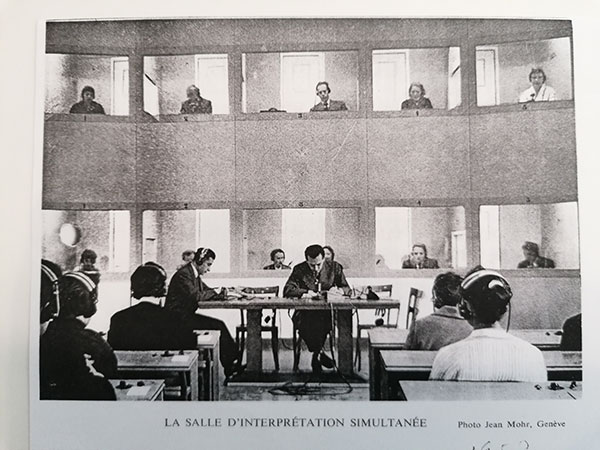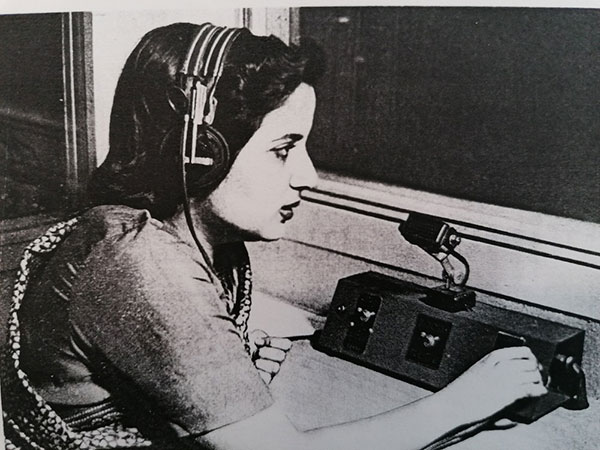Life at the FTI
The early days of interpreting in Geneva
The Geneva School of Interpreters (EIG, from the French “Ecole d’interprètes de Genève”) was founded in 1941 by visionary linguist Antoine Vellemann. The aim: to offer top-flight training in interpreting and translation. Classes at the EIG focussed heavily on multilateral diplomacy, given the fact that Geneva was home to international organisations such as the League of Nations and the International Labour Office. Thanks to technological progress, simultaneous interpreting began to progressively replace consecutive interpreting in international organisations throughout the 20th century. Following the broadcasting of debates at the Nuremberg trials (1945-1946), simultaneous interpreting really took off. In 1946, the first simultaneous interpreting trials were carried out at the Federal Palace in Bern in cooperation with the EIG.
 The interpreting room at the EIG in the 1950s
The interpreting room at the EIG in the 1950s
In 1972, the EIG became the School of Translation and Interpreting (ETI, École de traduction et d’interprétation), and then the Faculty of Translation and Interpreting (FTI) in 2011. The FTI is made up of three departments: the Translation Department, the Translation Technology Department, and the Interpreting Department.
 An interpreting student
An interpreting student
An ideal place to become a conference interpreter
Conference interpreting is synonymous with multilateralism. A large number of international organisations are headquartered in Geneva, including the United Nations Office at Geneva (UNOG), the World Health Organization (WHO), the World Trade Organization (WTO), the International Labour Office (ILO) and the World Intellectual Property Organization (WIPO). The official languages of the UN specialized agencies are English, French, Spanish, Russian, Arabic and Chinese, providing conference interpreters in Geneva with a wide variety of employment opportunities.
The multilingual nature of Switzerland also opens many doors for language combinations with other languages, such as German and Italian. From its position at the heart of Europe, Geneva is equally within arm's reach of other employers, such as the European Union institutions or the Council of Europe. Thanks to the networks maintained by the FTI and the Interpreting Department, students have multiple opportunities to work with the European institutions (visits to the institutions in Brussels, masterclasses delivered by staff interpreters at the European Commission and the European Parliament, meetings with heads of booth at the institutions, etc.)
The FTI is also a member of the European Masters in Conference Interpreting (EMCI) consortium, which brings together some fifteen interpreting faculties from universities around Europe. Over the course of their master’s, students can participate in short academic exchanges in partner universities, and the Department regularly welcomes visiting EMCI students.
Furthermore, the University of Geneva has signed a Memorandum of Understanding with the International Labour Office (ILO) and the World Intellectual Property Organization (WIPO), allowing students on the MA in Conference Interpreting to discover the inner workings of international conferences and to engage in some inactive booth practice (dummy booth).
Learn more about the syllabus of the MA in Conference Interpreting and the languages it offers.
Location and life on campus
Located close to the city centre and the main public transport links, the University of Geneva is easy to access for students, whether they live in Geneva, in another canton, or in neighbouring France. For additional information, consult the UNIGE website’s dedicated page on finding accommodation in Geneva and other practical issues.
The Interpreting Department, its classrooms and offices can be found on the 6th floor of the Uni Mail building.
Get in touch with the secretariat.
Fees and financial assistance
The fees for the MA in Conference Interpreting are set at 500 CHF (Swiss Francs) per semester. If you require financial assistance, it is possible to apply for a bursary or be granted a fee reduction. For further information, consult UNIGE’s dedicated webpage on financial assistance.
FTI and Interpreting Department news
Keep up to date with the FTI by taking a look at the FTI homepage and by signing up to the bimonthly e-bulletin. You can also follow the Interpreting Department on X (formerly Twitter):
Interpreting Department on X (formerly Twitter)
